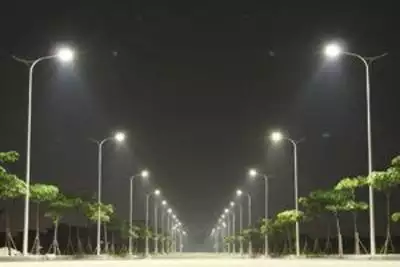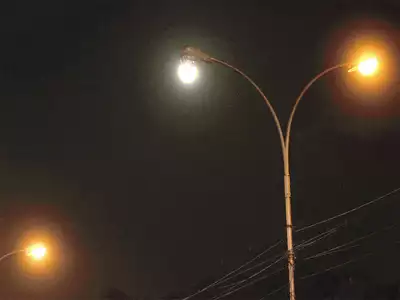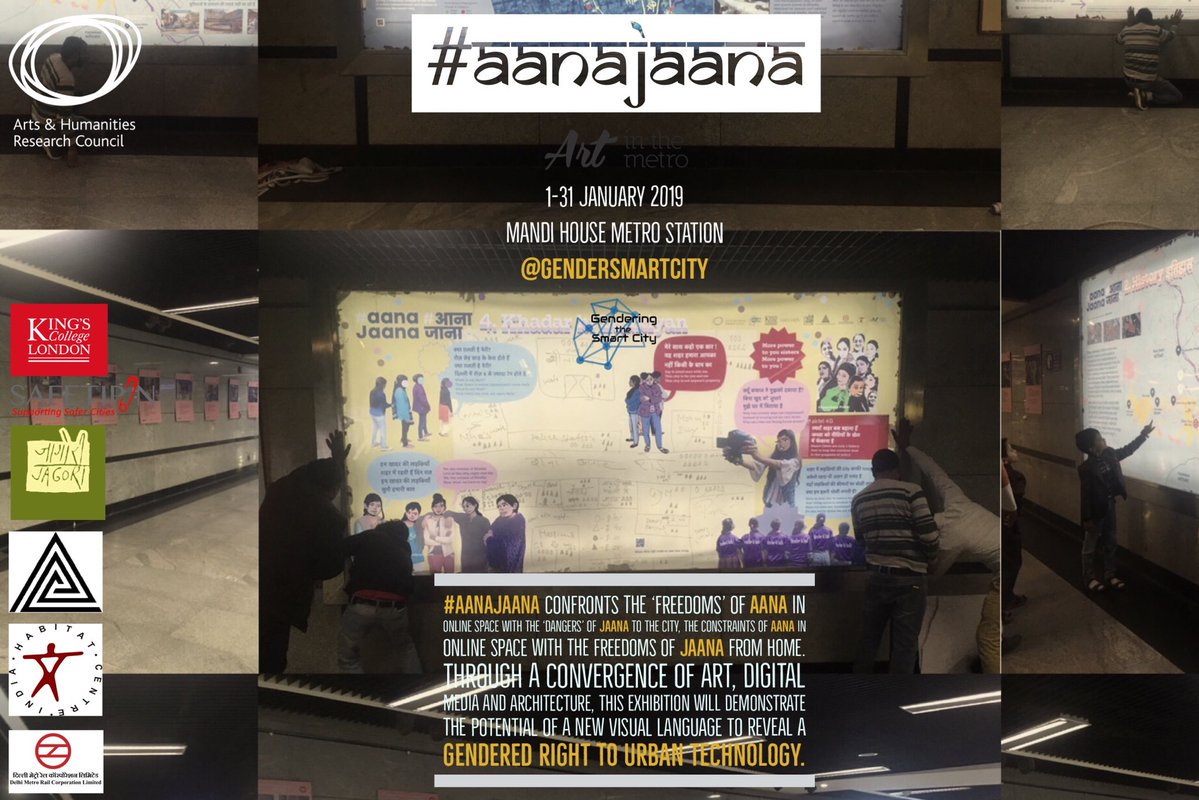How Safetipin data has been used to address women’s safety concerns in Delhi

Delhi, the capital city of India has a reputation of being unsafe, especially for women. Lack of safety in public spaces and public transport hinders women’s free movement. One of the biggest barriers to women’s economic mobility in cities including Delhi is the concern for safety - the ease of going to work and returning home. As per Census 2011, across Indian cities, women constitute only 22 percent of people who travel for work. Women’s choices for education, employment or even leisure are largely shaped by how safe they feel while using public spaces and public transport. A 2017 study by economist Girija Borker found that women in Delhi University actually chose lower ranked colleges if it made their commute shorter and safer. Another study conducted by Safetipin in three low-income neighbourhoods in Delhi NCR in 2019 highlights the impact of lack of safe public transport on the lives of young girls and women. The study found that girls and women preferred studying and working near their homes to avoid using public transport.

Against a backdrop of women’s safety in cities and violence against women in India, particularly in Delhi – Safetipin’s approach was an innovative response to the crisis at hand. Safetipin has developed several technology tools for collecting data in cities can help individual citizens navigate the city as well provide data to urban stakeholders to make changes and interventions towards safer and women friendly public spaces.
My Safetipin is an app that has several features which enhances women’s ability to move around safely in the city. Crowdsourced s data supplements other data sources to provide a safety score for areas and data on what elements make a place feel more unsafe. on women’s perception of safety in the city). Safetipin Nite is a data collection tool that generates images of the streets and public spaces for analysis.
The app was launched in Delhi in November 2013 and within 6 months, over 12K audits were done by residents of the city and Hindustan Times (a leading daily) supported this by advertising the app in their newspaper over a two-month period. We also reached out to colleges, NGO’s, RWA’s, community organisations and others to get more people to use the app are share their experiences to make the data richer and more robust .

In 2015, as part of a three-city study supported by Cities Alliance, we mapped the city of Delhi using our two apps; My Safetipin and Safetipin Nite and generated over 50,000 audit points. This entire dataset was available on the app for all citizens to view and interact with. In addition, it was also shared with key stakeholders in the Delhi government. The government constituted a multi-stakeholder group under the aegis of the Power Secretary to respond to our data specifically on dark spots in the city. 7,500 dark spots were identified and shared with the city government for carrying out improvement works.
Following the large-scale mapping, relevant departments requested mapping of specific areas including 16 metro stations on the yellow line of the Delhi metro where architects from NDMC (New Delhi Municipal Corporation) also participated in the safety audit to examine the last mile connectivity concerns. Ten important tourist monuments in the city were also mapped on safety parameters. This enabled the departments to make data driven decisions about what elements needed change and improvement to make public spaces safer and more accessible for all government.
In 2018, Safetipin was commissioned by the Department of Women and Child Development, Delhi government to collect data across the entire city in order to measure the changes that had been instituted and how it impacted women’s mobility. IN addition to the city wide mapping, we also audited over 600 public spaces including metro stations, bus stops, educational institutions, public parks and public toilets. With the support from Delhi Commission for Women (DCW), the Safetipin team connected with representatives of Mahila Panchayats from several local communities and trained them to conduct safety audits using the My Safetipin app. Residents from other neighbourhoods (Chittaranjan Park, Jamia Nagar, Madanpur Khadar, Bawana) also conducted safety audits in their respective neighbourhoods. The results of the 2018 mapping were presented to the Lieutenant Governor of Delhi. Data on lighting showed a 63 percent decrease in the number of dark spots from 7500 in 2015 to 2700 in 2018. Delhi's safety audits data has been used by the 'Mukhya Mantri Street Light Yojana' (Chief Minister’s Street Lights Scheme) as inputs to where lighting could be improved. The Delhi Police also used Safetipin’s data to reformulate their patrolling routes
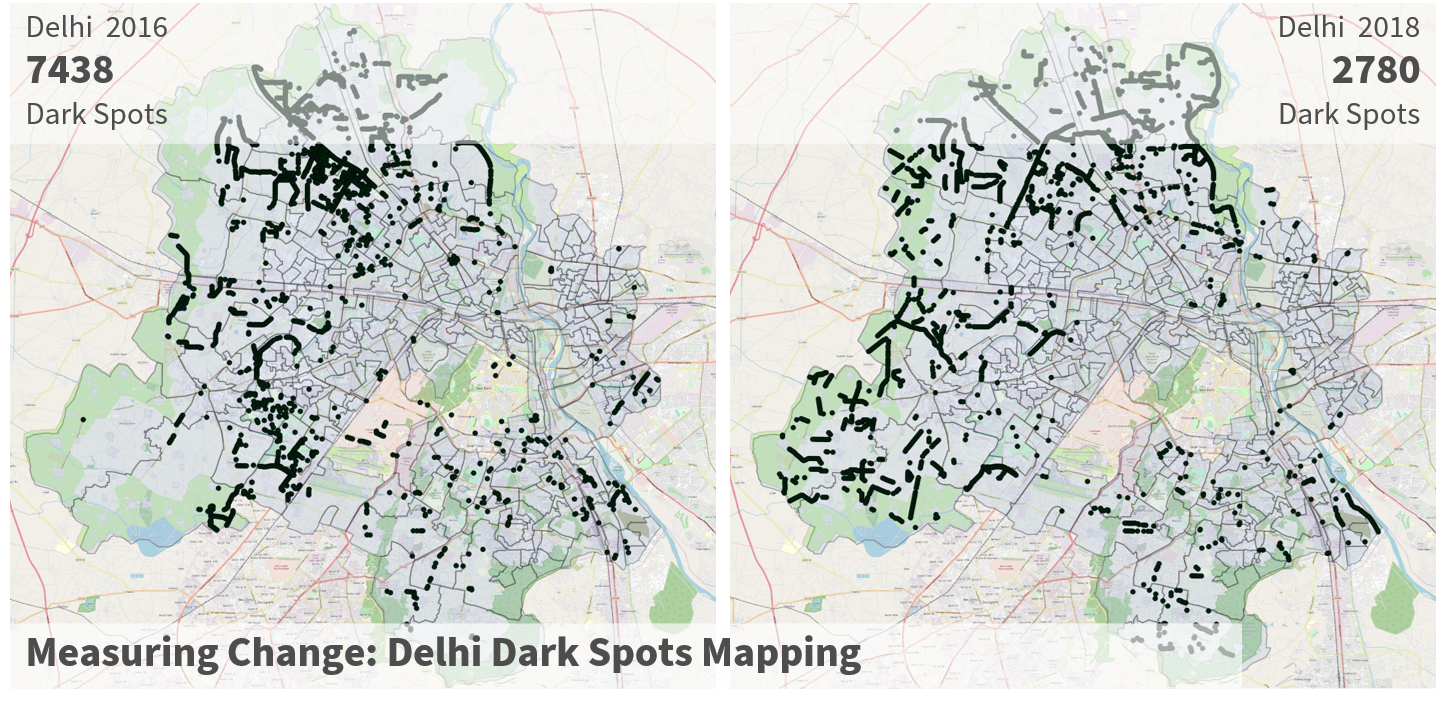
We are aware that all parts of the city do not have the same level of infrastructure and services. Further, we recognise that there is a gender digital divide in our country. We therefore work closely with several NGO’s and communities to ensure that the voices of the most marginalised are captured and reflected in our data as well. Some of our strategies have been get women to collect data in a group rather than individually so that even those who may not have a smart phone can share their perceptions. Another methodology is the Open Spaces Audit Mapping (OSAM) where the data for a neighborhood is shared in a public space for the community to interact with and stakeholders such as police and municipal actors are invited.
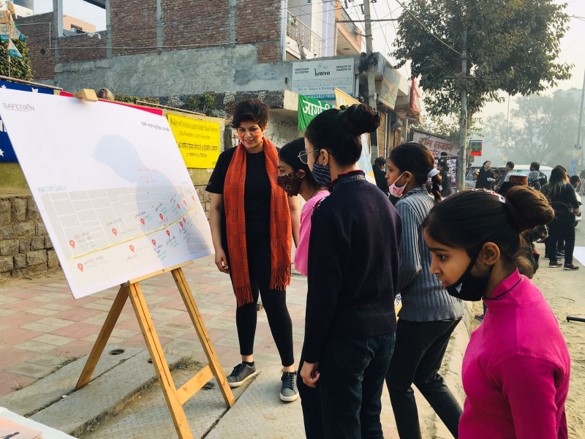
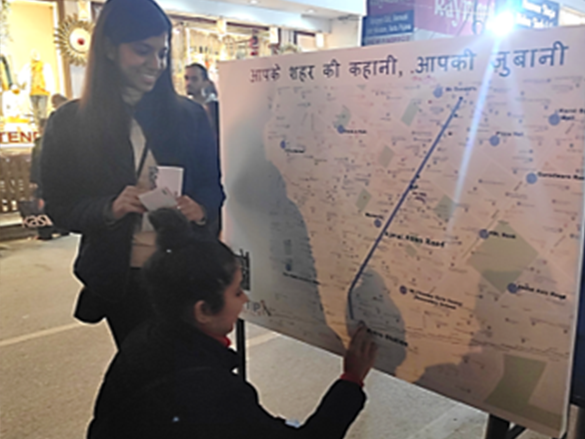
Partnerships are central to sustain the impact of our work at scale. We have worked closely with Jagori, a women’s resource centre since 2014 to engage women, especially young women from low-income neighborhoods at the peripheries of the city, to share their experiences about safety in the city. The young women were excited to use technology and were very quick to learn. One of the joint projects (in partnership with Kings College London)led to an exhibition that was displayed at the Mandi House Metro Station in Delhi in January 2019. Further the stories on young women’s aspirations and everyday challenges of safe mobility have been compiled in a hip-hop song named 'Khadar ki Ladkiyan' .
In a first-of-its-kind initiative to promote women’s safety at night, we collaborated with The North Delhi Municipal Corporation along with other organizations such as The Raahgiri Foundation, Center for Green Mobility and Jagori to organize a “Night Raahgiri” at a completely pedestrianized street (Ajmal Khan Road) in Delhi in December 2019. The Safetipin team conducted a mapping exercise with women to identify safe and unsafe places in the area.
Pedestrianized Ajmal Khan Road, 2019
"A large number of women in Delhi are not used to being out at night. Initiatives like these will help women step out of their homes and freely walk on the streets after sunset. The idea is to let women reclaim public space,"
Kalpana Viswanath
Co-Founder and CEO, Safetipin

More recently, amidst the rising violence against women during the pandemic, the Department of Women and Child Development, Delhi government collaborated with Safetipin to launch a new feature "Find Support"- a directory of services to assist girls and women in distress on the My Safetipin app. This launch event took place in August 2020 in partnership with UN Women.




